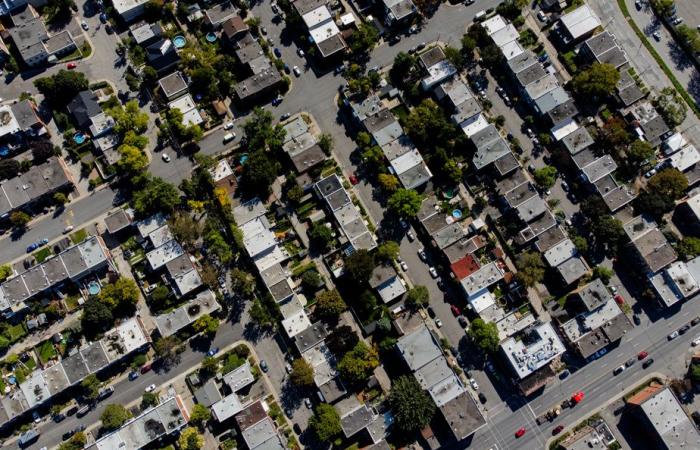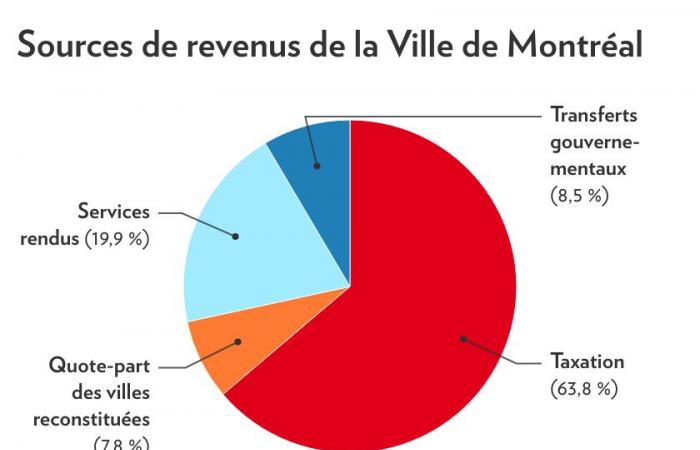Taxes will continue to increase in 2025 in Montreal, even if the increase will be less steep than in recent years. Why does a tax increase seem inevitable in our cities? And above all, are there ways to reduce our dependence on property taxes? Yes, say experts, but they come with sacrifices.
Published at 5:00 a.m.
“The reality is that Montreal, like most other cities, does not have infinite sources of income,” notes economist Michel Poitevin of the University of Montreal. In other countries in the world, cities can tax income, but here, everything goes through land value, i.e. properties. »
Unlike taxes which automatically increase with citizens’ income, taxing property values requires reviewing the level of taxation each year. The Plante administration, which unveils its latest budget this Wednesday, has already assured that it will limit the 2025 tax increase to the most recent inflation rate, i.e. 1.8%.
In the short term, this should give Montrealers some respite, after the increases of recent years (4.1% in 2022 and 4.9% in 2023).
Municipal taxes represent nearly two-thirds of Montreal’s revenue; the services provided (fines, price of permits, transfer taxes, etc.) represent a third.
The situation illustrates that we must quickly “diversify” the sources of revenue of Quebec municipalities, believes Mr. Poitevin. “I am in favor of charging more for public services. This is where we need to go, I believe, if we really want to reduce the level of taxes. »
“The occupation of the public domain by construction sites, for example, is something that could be priced,” says the professor. This is an example, but we need to review the model. Right now, what gets governments and cities elected is making projects. And it always involves taxes to finance them. »
Sacrifices
At UQAM, metropolitan management expert Danielle Pilette supports this idea. But she believes it would likely increase the price of housing.
The reality is that we cannot diversify our income that much without hurting certain people. In Toronto, diversification is done a lot through the pricing of public services, but in Montreal, I have the impression that this would accentuate inequities between citizens given that the gaps in income and housing prices are very significant. We are really in a different market.
Danielle Pilette, associate professor in the Department of Strategy, Social and Environmental Responsibility at UQAM
Valérie Plante and her party have long hoped to move away from the reign of property taxes as an almost sole source of financing. His administration is eyeing ecofiscality — the idea of linking taxes and environmental impact. Since June 2022, the City has been carrying out a vast “Montreal tax project”.
This project, “it is above all a way for the City to put pressure on the Government of Quebec, to highlight the need to finance certain sectors more,” believes Ms.me Drains.
“The fundamental principle of taxation is yield. And the property tax, as real estate is catching up, has a good return. Its strength lies in administrative simplicity, with an evaluation role and the names of the owners who, moreover, do not always live in Montreal, so the political repercussions are minimal,” she adds.
Other taxes?
On the sidelines of a Summit on taxation last year, Montreal notably considered several new solutions to finance its next budget, while a deficit of 200 million was envisaged for 2024. On the table: a tax on each kilometer traveled while driving a vehicle, another on vacant housing, another on impervious surfaces, including parking lots.
We also discussed the possibility of reducing the frequency of garbage removal or snow loading. More recently, in September, the president of the executive committee, Luc Rabouin, confided that he was considering the possibility of “giving up certain activities” currently carried out by the City, in a tight budgetary context.
“We review each of the programs one by one to ensure that we are able to optimize, change our ways of doing things and sometimes give up certain activities,” declared Mr. Rabouin, thus seeming to prepare the ground for a budget more responsible than in recent years.
This fall, the City also called on the boroughs to tighten their belts, by sticking “as much as possible” to inflation, to reduce the tax burden on citizens. On average, local tax increases will be 3.6% next year, which is significantly lower than in 2024, with 9.5%. In fact, 18 of the 19 districts are below or at the 5% mark.
Only LaSalle deviated from this rule, with taxes increased by 10%. Its mayor, Nancy Blanchet, said she did not want to reduce services to citizens. “We do not want to pay current expenses with surpluses, which will be much better invested in structuring projects,” she also argued.







